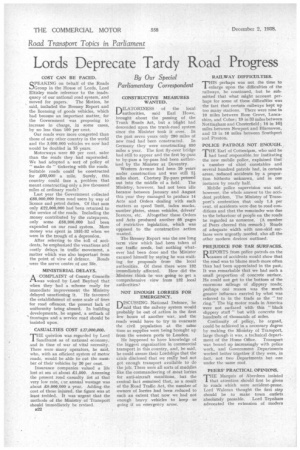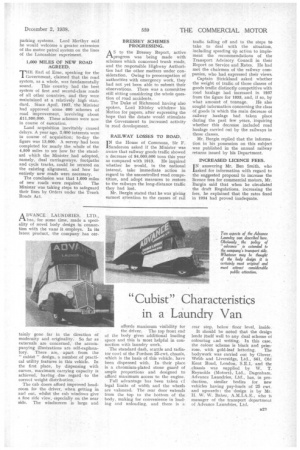Lords Deprecate Tardy Road Progress
Page 56

Page 57

If you've noticed an error in this article please click here to report it so we can fix it.
By Our Special Parliamentary Correspondent
COST CAN BE FACED.
SPEAKING on behalf of the Roads .--)Group in the House of Lords, Lord Eltisley made reference to the inadequacy of our national road system, and moved for papers. The Motion, he said, included the Bressey Report and the licensing of goods vehicles, which had become an important matter, for the Government was proposing to increase in charge, in some cases. by no less than 100 per cent.
Our roads were more congested than those of any other country in the world and the 3,000,000 vehicles we now had would be doubled in 15 years.
Motorways were 80 per cent, safer than the roads they had superseded. We had adopted a sort of policy of " make do" tinkering with the roads. Suitable roads could be constructed for 260,000 a mile. Surely, this country could face a problem that meant constructing only a few thousand miles of ordinary roads?
Last year the Government collected £88,000,000 from road users by way of licence and petrol duties. Of that sum only £22,000,000 had been returned to the service of the roads. Including the money contributed by the ratepayers, only some £58,000,000 had been expended on our road system. More money was spent in 1931-32 when we were in the trough of a depression.
After referring to the toll of accidents, he emphasized the vexatious and costly delays in traffic movement, a matter which was also important from the point of view of defence. Roads were the nerve centre of our life.
MINISTERIAL DELAYS.
.1-1 A COMPLAINT of County Councils
was voiced by Lord Bayford that when they had a scheme really for immediate improvement the Ministry delayed sanctioning it. He favoured the establishment of some scale of fines for road offences, the present lack of uniformity being absurd. In building developments, he argued, a setback of frontages and a service road should be insisted upon.
CASUALTIES COST 127,000,000. 'THE question was regarded by Lord J. Sandhurst as of national economy, and in time of war of vital necessity. There were many operators, he said, who, with an efficient system of motor roads, would be able to cut the number of their vehicles by 20 per cent.
Insurance companies valued a life lost at sea at about L1,500. Assessing the present road casualty list at that very low rate, cur annual wastage was about £9,000,000 a year. Adding the cost of those injured, the figure was at least trebled. It was urgent that the methods of the Ministry of Transport should immediately be revised.
B22 CONSTRUCTIVE MEASURES WANTED. .
DILATORLNESS of the local authorities, said Earl Howe, brought about the passing of the Trunk Roads Act, but a blight had descended upon the trunk-road system since the Minister took it over. In the past seven years only 280 miles of
new road had been constructed. In Germany they were constructing 650 miles a year. The first fly-over bridge had still to appear and the first by-pass to by-pass a by-pass had been authorized by the Minister at Daventry.
Western Avenue had been 20 years under construction and was still 21 miles short. Chertsey By-pass petered out into the middle of a field. The Ministry, however, had not been idle because between January and August this year they managed to produce 14 Acts and Orders dealing with such matters as speed limit, index marks, number plates, steam vehicles, drivers' licences, etc. Altogether these Orders and Acts produced another 68 pages of restrictive legislation, which was opposed to the constructive action wanted.
The Bressey Report was the one long term view which had been taken of our traffic needs, but nothing whatever had been done and the Minister excused himself by saying he was waiting for proposals from the local authorities. Of these there were 132 immediately affected. How did the Minister think he was going to get a comprehensive view from 132 local authorities?
NOT ENOUGH LORRIES FOR EMERGENCY.
DISCUSSING National Defence, he said that the railway system would probably be out of action in the first few hours of another war, and the roads would have to -try to evacuate the civil population at the salne time as supplies were being brought up from the western ports to London.
He happened to have knowledge of the biggest organization in commercial transport in this country, and, he said, he could assure their Lordships that the crisis disclosed that we really had not got enough transport available to do the job'. There were all sorts of muddles like the commandeering of meat lorries for anti-aircraft munitions, but the central fact remained that, as a result of the Road Traffic Act, the number of owners of lorries had been reduced to such an extent that now we had not enough heavy vehicles to keep us going if an emergency arose. RAILWAY DIFFICULTIES.
THIS perhaps was not the time to enlarge upon the difficulties of the railways, he continued, but he submitted that what might account perhaps for some of these difficulties was the fact that certain railways kept up too many stations. There were nine in 10 miles between Rose Grove, Lancashire, and Colne ; 19 in 33 miles between Nottingham and Chesterfield ; 14 in 161miles between Newport and Blaenavon, and 13 in 16 miles between Southport and Preston.
POLICE PATROLS NOT ENOUGH.
TEarl of Cottenh,am, who said he had beeri" responsible for instituting the new mobile police, explained that a number of chief constables and several hundred patrols had, in certain areas, reduced accidents by a proportion hitherto unknown, and in one instance by nearly half.
Mobile police supervision was not, however, the whole answer to the accident problem. The Ministry of Transport's contention that only 1.5 per cent, of accidents were due to road conditions and that the remainder was due to the behaviour of people on the roads he regarded as nonsense. (A number of Peers cheered this remark.) Roads of adequate width with non-skid surfaces were urgently needed, also all the other modern devices outlined.
PREJUDICE FOR TAR SURFACES.
REPORTS from police patrols on the causes of accidents would show that the road was to blame much more often than had been appreciated in the past: It was remarkable that we had such a small proportion Of concrete surface. He could not get to the bottom of the enormous mileage of slippery roads; perhaps one reason was the much greater influence exerted by what was referred to in the trade as the "tar ring." The big motor roads in America were not surfaced with this "black slippery stuff " but with concrete for hundreds of thousands of miles.
Continuity of policy, he argued, could be achieved in a necessary degree by making the Ministry of Transport, large though it was, a technical department of the Home Office. Transport was bound up increasingly with police work, and Government Departments worked better tdgether if they were, in fact, not two Departments but one under the same roof.
PEERS' PRACTICAL OPINIONS. THE Marquis of Aberdeen insisted 1 that attention should first be given to roads which were accident-prone. Lord Waleran thought the first step should be to make town outlets absolutely passable. Lord Teynham advocated the extension of modern parking systems. Lord Merthyr said he would welcome a greater extension of the motor patrol system on the lines of the Lancashire experiment.
1,000 MILES OF NEW ROAD AGREED.
THE Earl of Erne, speaking for the Government, claimed that the road system, as a whole, was fundamentally
sound. This country had the best system of first and second-class roads of all other countries, and they were maintained at a relatively high standard. Since April, 1937, the Minister had approved some 600 schemes of road improvement, involving about £11,500,000. These schemes were now in course of execution.
Land acquisition inevitably caused delays. A year ago, 3,600 interests were in course of acquisition; to-day the figure was 13,000. A survey had been completed for nearly the whole of the 4,500 miles to see how far the standard which the Minister had adopted, namely, dual carriageways, footpaths and cycle tracks, could be secured on the existing alignment, and how far entirely new roads were necessary.
The conclusion was that 1,000 miles of new roads were required. The Minister was taking steps to safeguard their lines by Orders under the Trunk Roads Act. BRESSEY SCHEMES PROGRESSING.
As to the Bressey Report, active progress was being made with schemes which concerned trunk roads, and the responsible Highway Authorities had the other matters under consideration. Owing to preoccupation of authorities with emergency work, they had not yet been able to submit their observations. There was a committee still sitting considering the whole question of road accidents.
The Duke of Richmond having also spoken, Lord Eltisley withdrew his Motion for papers, after expressing the hope that the debate would stimulate the Government to increased activity in road development.
RAILWAY LOSSES TO ROAD.
I N the House of Commons, Sir F.
Sanderson asked if the Minister was aware that railway goods traffic showed a decrease of 84,000,000 tons this year as compared with 1913. He inquired whether he would, in the national interest, take immediate action in regard to the uncontrolled road competition, and adopt measures to restore to the railways the long-distance traffic they had lost.
Mr. Burgin stated that he was giving earnest attention to the causes of rail traffic falling off and to the steps to take to deal with the situation, including speeding tip action to implement the recommendations of the Transport Advisory Council in their Report on Service and Rates. He had met the chairmen of the railway companies, who had expressed their views.
Captain Strickland asked whether the weight of traffic of those classes of goods traffic distinctly competitive with road haulage had increased in 1937 from the figure for 1932, and, if so, by
what amount of tonnage. He also sought information concerning the class of goods in which the main decrease of railway haulage had taken place during the past few years, inquiring whether this decrease included road haulage carried out by the railways in those classes.
Mr. Burgin replied that the information in his possession on this subject was published in the annual railway returns issued by his Department.
INCREASED LICENCE FEES.
TN answering Mr. Ben Smith, who 'asked for information with regard to the suggested proposal to increase the licence fees for commercial motors, Mr. Burgin said that when he circulated the draft Regulations, increasing the fees, he explained that the rates fixed in 1934 had proved inadequate.




























































































